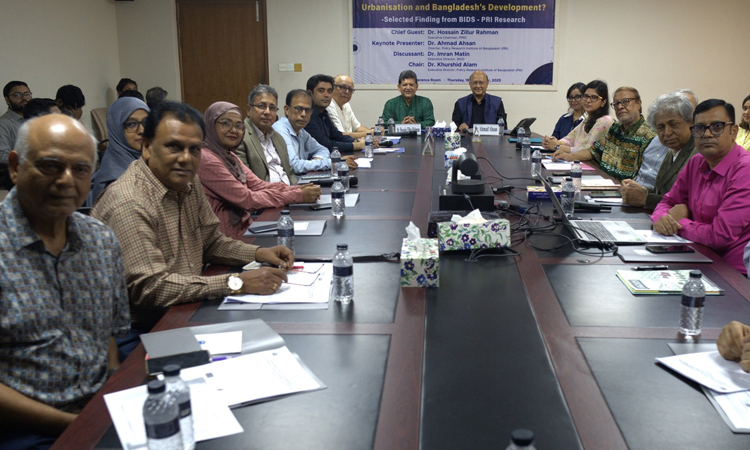News Flash


DHAKA, Sept 18, 2025 (BSS) - Experts at a seminar today laid emphasis on decentralized city governments with authority and resources to operate transparently and accountably.
They observed that urbanization has expanded without parallel improvements in urban services, creating deep mismatches.
They made the observation at the seminar on "Urbanisation and Bangladesh's Development: Selected Findings from BIDS-PRI Research" at the Policy Research Institute (PRI) in the city, said a press release.
The event brought together policymakers, researchers, and development practitioners to discuss the critical role of urbanisation in Bangladesh's growth trajectory.
The program opened with welcoming remarks by Dr. Khurshid Alam, Executive Director of PRI and Chair of the session.
He said, "Dhaka's growth was unplanned and reactive, with policies constantly trying to catch up with realities. The concentration of facilities in Dhaka has made both citizens and institutions reluctant to relocate."
Dr. Hossain Zillur Rahman, Executive Chairman of the Power and Participation Research Centre (PPRC), attended the program as chief guest.
Dr. Rahman noted that just as villages disappeared from researchers' focus in the 2000s, cities now risk similar neglect, making urban-centered research urgent.
He said that managing cities requires specialized skills, which are currently missing at all governance levels and must be urgently developed.
The keynote presentation was delivered by Dr. Ahmad Ahsan, Director of PRI, who presented findings from a joint BIDS-PRI research project.
Dr. Ahsan said: "While urbanization had long been a driver of growth, the current Dhaka-centric pattern was proving unsustainable. Excessive concentration of people and economic activity in the capital-together with congestion, pollution, and diversion of resources from other urban centers-was sharply hampering development, slowing job creation, reducing industrial employment, and causing economic losses estimated at 6-10 percent."
Dr. Ahsan emphasized the need for unified, decentralized city governments with authority and resources to operate transparently and accountably.
He also pointed to strategic opportunities, including Chattogram's port and regional development and the Khulna bypass corridor, as priorities to restore urban dynamism and drive Bangladesh's next phase of growth.
Discussant Dr. Imran Matin, Executive Director of BRAC Institute of Governance and Development (BIGD), emphasized that the study relied on highly disaggregated data, which are rarely available, and urged BBS to lead in producing such datasets.
He highlighted the costly 'missing middle' dynamic where resources bypass second-tier cities and flow directly to more rural areas."
He called for harnessing knowledge outside Dhaka and ensuring citizen participation in city governance.
Dr. Ashikur Rahman, Principal Economist of PRI, said that city development authorities were designed to weaken city corporations and centralize power.
This was the first in PRI's two-part talk series. The next seminar, scheduled for September 25, 2025, will feature Dr. Ahmad Ahsan speaking on "Can Bangladesh Develop without Decentralizing?"